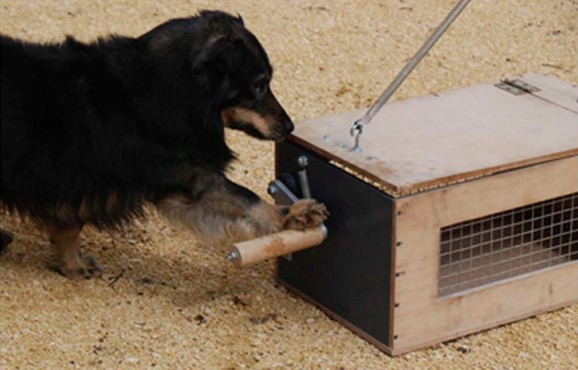Study Shows Wolves Are Better Than Dogs At Learning From One Another
This article is more than 2 years old
 Dogs may be a man’s best friend, but that friendship may have come at a price. A new study published in PLOS One indicates that when we domesticated dogs, we made them less able to learn from each other.
Dogs may be a man’s best friend, but that friendship may have come at a price. A new study published in PLOS One indicates that when we domesticated dogs, we made them less able to learn from each other.
Don’t get me wrong, dogs are awesomely trainable. Before the Superbowl I was watching some kind of dog-lympics, where dogs performed crazy choreographed routines involving Frisbees. And let’s not forget seeing-eye dogs, drug and bomb sniffing dogs, and all the other kinds that demonstrate just how intelligent they are. But the thing is, as dogs have adapted to our teachings, they’ve stopped learning how to imitate one another.
Two animal behavior researchers at the Wolf Science Center in Austria put this theory to the test by giving puppies problems to solve—in this case, a closed wooden box containing a treat. They trained one dog how to open the box by pushing a lever with its paw; they trained another to open the box with its mouth. Then they let the students into the classroom—12 wolves and 15 mutts, all the same age and all raised at the center.
 One by one, they brought the dogs and wolves into a room containing the closed treat box. Then they brought in one of the dogs they trained to demonstrate how to access the treat. The researchers allowed the “student” dog or wolf to eat the treat after the demonstration. They did this six times in a row, figuring that the lesson would stick after a half-dozen times. Despite that, most of the puppies were stymied and looked to the humans in the room for some kind of help. 4 of the 15 dogs got the box open, and only two of them got the box open a second time. None of the successful dogs used the same strategy modeled to them by the “teacher” dogs. If you want to see how pitiful these dogs were when it came to opening the box, watch this video.
One by one, they brought the dogs and wolves into a room containing the closed treat box. Then they brought in one of the dogs they trained to demonstrate how to access the treat. The researchers allowed the “student” dog or wolf to eat the treat after the demonstration. They did this six times in a row, figuring that the lesson would stick after a half-dozen times. Despite that, most of the puppies were stymied and looked to the humans in the room for some kind of help. 4 of the 15 dogs got the box open, and only two of them got the box open a second time. None of the successful dogs used the same strategy modeled to them by the “teacher” dogs. If you want to see how pitiful these dogs were when it came to opening the box, watch this video.
 The wolves, however, all got gold stars, and treats. All 12 opened the box on the first try. 9 of them used the same method demonstrated by the teacher dog, and most of them could replicate their success again and again. The scientists pursued various explanations for the dramatic results. They tried replicating the test with dogs that were 18 months old, figuring that perhaps the wolves developed more quickly and were thus more able to complete the task when they were so young, but the results for the older dogs were the same. Maybe the wolves were just inherently better box-openers. The scientists repeated the experiment without teaching the wolves first, and they weren’t able to figure out how to open the box. The wolves weren’t any more curious than the dogs when it came to investigating the box. One by one, the researchers ruled out all the possible explanations except that the dogs weren’t good at learning from each other.
The wolves, however, all got gold stars, and treats. All 12 opened the box on the first try. 9 of them used the same method demonstrated by the teacher dog, and most of them could replicate their success again and again. The scientists pursued various explanations for the dramatic results. They tried replicating the test with dogs that were 18 months old, figuring that perhaps the wolves developed more quickly and were thus more able to complete the task when they were so young, but the results for the older dogs were the same. Maybe the wolves were just inherently better box-openers. The scientists repeated the experiment without teaching the wolves first, and they weren’t able to figure out how to open the box. The wolves weren’t any more curious than the dogs when it came to investigating the box. One by one, the researchers ruled out all the possible explanations except that the dogs weren’t good at learning from each other.
The researchers believe that dogs’ willingness and desire to please humans may have come from an inherent desire to cooperate with others in their pack, but that over time humans have chosen to breed the dogs that are most focused on doing what humans want them to do. The need to learn from each other became obsolete, so they’ve generally forgotten how. This theory that flies in the face of previous research that suggests dogs, especially puppies, learn by mimicking the behavior of other dogs. Still, I’d love to see a wolf in one of those Frisbee contests.












